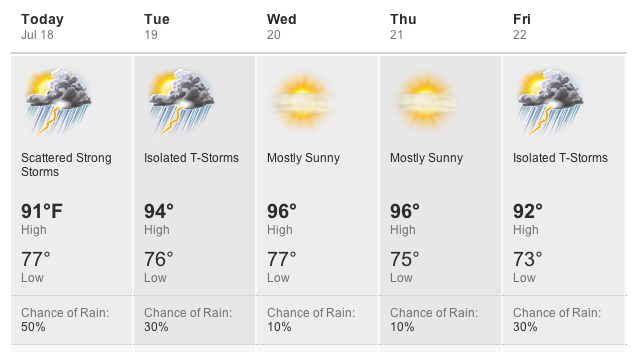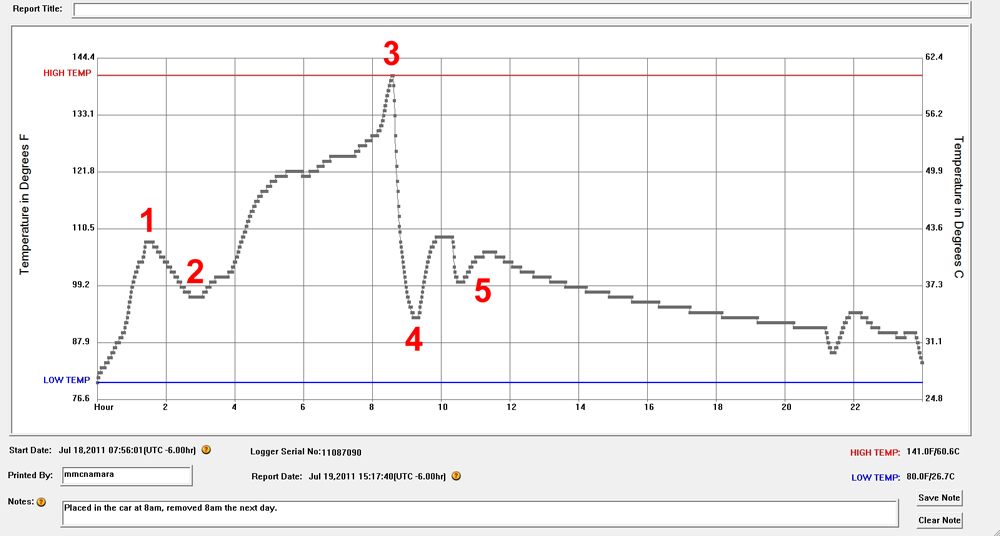Recap
In Beat the Heat (part 1) I talked about issues someone recording temperature (and humidity) may face when going through the extreme heat of the summer. Also, here's the weather for the week my experiment/sample was conducted (same image from part 1):
Knowing the weather is important so you can get a baseline of the conditions I talk about. In part two of this mini series I'm going to give you a real life example of why the summer heat can be so dangerous. What I discuss below is the real life data of how hot your car can get on a sunny day.
The Setup
Where and When
The sampling occurred between 7:56 AM CST on July 18, 2011 and around 8 AM CST on July 19, 2011. The majority of what I talk about here is the data between 8 AM and 5 PM on July 18, 2011. The location was outside our building in Addison, IL
Data Collection
I used our 1-Day Report logger (RL101). It was perfect for this application because I needed pretty general data; I was looking for a quick graph showing me the overall trends and the Min/Max. It's compact size was also great for just tossing it in my car and leaving it there (you can easily toss the RLs into shipments, packaging, etc).
The logger's stated accuracy is +/- 1.8F.
The Subject
I placed the Report Logger into my car. It is a newer, 4-door sedan, license pl.... oh wait, don't want to give you that. Windows were up for the duration of the test.
The Results
Bottom line: cars get really, really hot when left in the summer heat. Let's look at the specifics; here's the graph:
I've marked some important and noticeable events on the graph. Here are their explanations:
- The initial peak topping out at approximately 108F. What's amazing to me is that this is early morning and the increase occurred in less than two hours!
- A decrease and subsequent increase occur, most likely due to cloud cover (it never rained though).
- At about 4:20 PM we hit our 24-hour temperature maximum of 141.0F. That is hot. I should note here that this may have gone even higher had I let it, which leads me to...
- My drive home. You can clearly see where I turned on the AC. The rise between 4 and 5 is during my workout and then my drive home; the temperature gets back up over 100F quite quickly.
- From here until logging stopped was in my garage overnight, my drive to work, and the early morning at work.
What This Means
For Individuals
Cars get extremely hot in the sun. Dangerously so. I don't think this is news to anyone considering we tragically hear of children being left in cars all too often, but I never realized how hot a car can get.
My car peaked at 141F (and arguably, I didn't give it enough time to get higher). In under two hours it was over 108F. At 105.1F the body is already at risk of hyperthermia (the opposite of hypothermia) and heat stroke. A body at 107F is considered leathal. You can see how quickly something can go wrong.
So, it is obviously really important not to leave children or pets in cars. Even for short periods of time. Additionally, it is important to check on neighbors, family, and friends when it gets to extreme levels of heat.
For Businesses
There are numerous situations where heat can cause issues in business. The one I'll point out here is shipping goods as it relates most closely to the car example. Semi trailers are extremely sensitive to the summer's heat. Even if you are using a refrigerated truck the cargo should be monitored in case something goes wrong (your AC breaks-always at the worst time too- right?).
Our report loggers are very affordable, require no software at the destination (though it does require a Windows computer), they can record in a wide range of temperatures and they record from 1 to 90 days depending on the model. These guys are so compact they can be tossed right along your shipment. Invest in some to avoid the potential loss of large amounts of sensitive goods. We can't guarantee something will happen, but I hear all too often about people coming to me saying they wish they had spend the money on a relatively cheap logger and possibly avoided losing very expensive goods. What's that saying? An ounce of prevention is a pound of cure.
Well that's my PSA for the month. Stay cool and stay hydrated.


